|
|
|
Sort Order |
|
|
|
Items / Page
|
|
|
|
|
|
|
| Srl | Item |
| 1 |
ID:
120780
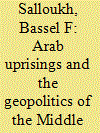

|
|
|
|
|
| Publication |
2013.
|
| Summary/Abstract |
The contest between Saudi Arabia and Iran played out in Lebanon, the West Bank and Gaza Strip, postwar Iraq and, to a lesser extent, Yemen and Bahrain, has shaped the geopolitics of the region since the 2003 US invasion and occupation of Iraq. The Arab uprisings intensified this geopolitical contest and spread it to Syria. The sectarianisation of the region's geopolitical battles, and the instrumental use of some of the uprisings for geopolitical ends, has hardened sectarian sentiments across the region, complicated post-authoritarian democratic transitions, and, at least in Syria's case, transformed its popular uprising into a veritable civil war.
|
|
|
|
|
|
|
|
|
|
|
|
|
|
|
|
| 2 |
ID:
124480
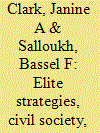

|
|
|
|
|
| Publication |
2013.
|
| Summary/Abstract |
This article explains the endurance of sectarian identities and modes of political mobilization in Lebanon after the civil war. This is done by examining three case studies that demonstrate a recursive relation between sectarian elites and civil society actors: on one side of this relation, sectarian elites pursue their political and socioeconomic interests at the expense of civil society organizations (CSOs); on the other side, civil society actors instrumentalize the sectarian political system and its resources to advance their own organizational or personal advantage. These mutually reinforcing dynamics enable sectarian elites to penetrate, besiege, or co-opt CSOs as well as to extend their clientelist networks to CSOs that should otherwise lead the effort to establish cross-sectarian ties and modes of political mobilization or that expressly seek to challenge the sectarian system. The article fills a gap in the literature on sectarianism in postwar Lebanon and helps explain a puzzle identified by Ashutosh Varshney in the theoretical debate on ethnic conflict, namely the reasons behind the "stickiness" of historically constructed ethnic identities
|
|
|
|
|
|
|
|
|
|
|
|
|
|
|
|
| 3 |
ID:
153942
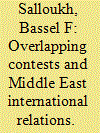

|
|
|
| 4 |
ID:
152576
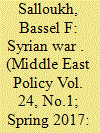

|
|
|
| 5 |
ID:
165176
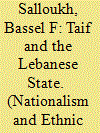

|
|
|
|
|
| Summary/Abstract |
The political reforms adopted in the 1989 Taif Agreement created a veritable postwar paradox: a more balanced consociational power-sharing arrangement led to a bigger, more clientelist, more corrupt, less autonomous public sector, one preoccupied by predatory rentier practices along sectarian and clientelist lines. The more durable the power-sharing arrangement the less the state in Lebanon acts as a state with a measure of bureaucratic autonomy, extractive capacities, and a national agenda. This article problematizes this postwar anomaly by examining the instrumental role played by the public sector in the reproduction of the political elite’s clientelist ensemble undergirding the political economy of sectarianism.
|
|
|
|
|
|
|
|
|
|
|
|
|
|
|
|
| 6 |
ID:
167662
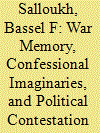

|
|
|
|
|
| Summary/Abstract |
How does sectarianism intersect with war memories to subvert the political balance of power in postwar Lebanon? This article examines this complex dynamic along two levels. On one level, it demonstrates how war memory is deployed selectively from above by members of the political elite to sabotage the national war memory sanctioned officially and corresponding to a particular postwar confessional balance of power. At another level is the confessional or sectarian use of memory to resist this postwar political balance of power perceived as unjustly tipped against the subnational community. The argument advances in two steps. I first examine how war memory is invoked during crucial political battles that impact the postwar confessional balance of power. I take the debate around the promulgation of a new electoral law, and the 2018 parliamentary elections, in the context of the regional repercussions of the explosion of the Islamic State in Iraq and Syria (ISIS) and the spillover effects of the Syrian war on Lebanon, as a case study of how different elites not only invoke war memories to contest or defend the postwar confessional balance of power but also to advance intra-sectarian political prerogatives. I then consider political memory as part of a complex and variegated confessional imaginary that survives at the private level in the form of resistance by substantial sectors of the Christian community to the postwar political balance of power and to the official national narrative of the war, one that refuses to revisit some of its most sordid moments, namely, its massacres. The article closes by underscoring the importance of reconciling dissonant memories of the war as a prerequisite for achieving genuine justice, peace, and reconciliation in postwar Lebanon.
|
|
|
|
|
|
|
|
|
|
|
|
|
|
|
|
|
|
|
|
|